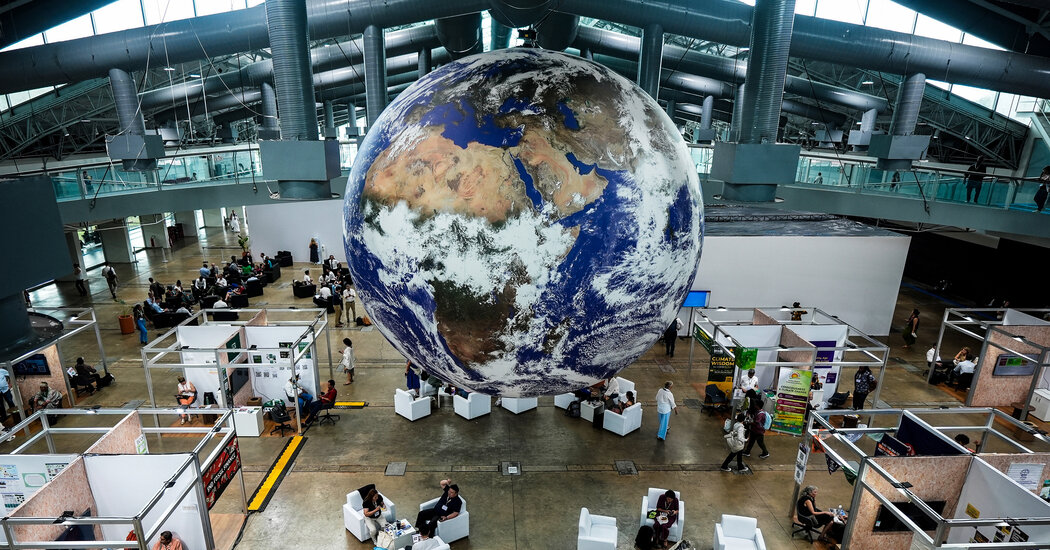
In the weeks following President Trump’s re-election, there was a lot of talk about who would fill the global climate leadership vacuum left behind by the Biden administration.
Some would argue this was a flawed premise. The United States has long been an at-best-unreliable presence in global climate negotiations. It is the only country to withdraw from the Paris Agreement, in which 194 other governments pledged to keep global warming to relatively safe levels. The U.S. left the agreement in President Trump’s first term, only to rejoin under President Biden and it is now in the process of withdrawing again.
Regardless, as international negotiators gather in Belém, Brazil, for this year’s U.N. climate talks, known as COP30, there are a few early indicators about who’s stepping up on the global stage and who’s stepping back.
Here’s where things stand.
Next up: China
Cheap green tech exports out of China are starting to substantially change the economic development trajectory of some countries, Somini Sengupta and Brad Plumer report from Belém.
“China has sought to cast itself as a pillar of global stability,” they write, “particularly after the Trump administration said it would withdraw the United States from the annual climate talks.”
The result is that drivers in countries like Vietnam, Nepal and Ethiopia are opting for electric vehicles over combustion engines, and places all over the world have begun installing solar arrays made with Chinese equipment.
(We’ve been reporting all year about China’s clean energy boom, including how it’s leaving the U.S. behind in nuclear development, clean energy patents and building out ultra high-voltage power lines. Read more from our series.)
Yet much of China’s clean tech manufacturing boom has been powered by a parallel expansion in coal, so its emissions have continued to increase.
But the rapid pace of China’s clean energy installations may be flattening that curve: its emissions are projected to rise by just 0.4 percent this year, or even fall slightly, Plumer reports.
The newcomer: Gavin Newsom
Gov. Gavin Newsom of California, a Democrat, has seized on the Trump administration’s absence at the conference to show up at U.N. climate talks in person for the first time, pitching himself as a “stable and reliable” partner to the world, Somini Sengupta reports.
“Donald Trump didn’t show up at COP30 but California did,” Newsom said.
The likely 2028 presidential hopeful drew big crowds at COP, where he encouraged climate advocates to reframe climate issues in terms of affordability.
As Sengupta pointed out, though he was a strong critic of the oil and gas industry just a few years ago, Newsom this year made it easier to drill for oil in California, a move he defended as “pragmatic” when pressed about it at COP.
The pragmatist: Brazil
Another government that has tried to balance promises to slash emissions with its sizable fossil fuel revenue is Brazil, the host of this year’s talks.
President Luiz Inácio Lula da Silva called for leaders at COP to build a road map to overcome dependence on fossil fuels, building on promises made in previous years. By 2025 global climate diplomacy standards, it is a bold idea, and will undoubtedly face opposition from some countries.
In recent years, Brazil has significantly reduced deforestation, Ana Ionova reported. But just weeks before the summit began, Brazil paved the way to allow oil drilling near the mouth of the Amazon River.
This decision drew blowback. Dozens of Indigenous protesters burst into the conference venue on Tuesday, demanding preservation of their land and criticizing the oil exploration plan.
Not in the room: U.S. Corporations
It wasn’t so long ago that leaders of America’s biggest companies were proclaiming their commitments to climate issues.
That’s not the case anymore, Ivan Penn and David Gelles report. Whereas past COPs have drawn top executives from Apple, Exxon and Bank of America, this year’s summit has drawn no prominent American leaders.
Some of what’s driving the corporate absence at COP is fear of retribution from the Trump administration, experts told Penn and Gelles.
Under the surface, the picture is a little more complicated. Some companies are proceeding with business as usual, pursuing the same climate commitments as ever minus the flashy marketing push, Harvard researchers Neil Hawkins and Kelly Cooper found in a paper published in June. A smaller number are walking back their sustainability goals.
Still, by now it’s clear that mainstream corporate America is not rushing to position itself as the antidote to U.S. climate retrenchment. As one expert told my colleagues, the risk of drawing the ire of the Trump administration seems to outweigh the benefit of trumpeting climate progress on the global stage.
Read more of our coverage of COP30 here.
Natural resources
Who gets to use the Colorado River’s water? It’s complicated.
Years ago, as a young environmental reporter, when I first learned that the Colorado River’s water is divvied up based on a century-old agreement, I was astonished. So much in the American West has changed over that time — the engineering feat of the Hoover Dam, the birth of entire cities and of suburbs, the dawn of air-conditioning.
All of that, plus climate change.
Over the past quarter century, steady downward trends in precipitation and rising temperatures across the Southwest have fueled the longest period of drought the region has experienced since at least the year 800. (That’s not a typo. It’s been that long.)
It is therefore no surprise that renegotiating use of the waterway has proved incredibly difficult. Some 40 million people across seven states and parts of Mexico rely on the river’s water. And there’s been an ongoing battle over water usage between states in the lower river basin — Nevada, Arizona and California — and in the upper river basin — Colorado, Utah, Wyoming and New Mexico.
So no one paying attention was surprised when those states and the federal government missed their latest deadline to agree upon a new, sustainable plan for the coming decades, as I reported Tuesday.
What comes next? The talks have dragged on for years, only now with heightening stakes. The U.S. Bureau of Reclamation had set a Nov. 11 deadline to give a cushion of time before the water usage rules, which date to 1922 and were last tweaked in 2007, expire at the end of this year.
A new plan, ideally one that would last for decade, must be in place by the fall of 2026 to govern Colorado River water deliveries starting in 2027. To ensure that happens, Reclamation officials have set the next deadline for February.
In the meantime, the negotiators will be looking to the mountains, where the snowpack that will feed the vast majority of next year’s river flow has already started building up. In 2023, a snowy winter bought them extra time to resolve the crisis — time that may now be running out.
In one chart
It looks like another record year for carbon dioxide emissions
Global fossil fuel emissions are on track to soar to record highs in 2025 and show no signs of declining overall, although there are indications of a recent slowdown in China’s emissions, according to data from the Global Carbon Project. — Brad Plumer
Lost science
“My team conducts interviews with the people who manage these facilities along the coast and asks them: What keeps you up at night when a storm is heading up the coast?”
Austin Becker is a professor and the chair of Marine Affairs at the University of Rhode Island. He developed an early-warning system that helps emergency managers quickly get information about the potential damage to critical infrastructure from hurricanes and nor’easter storms. In April, the Department of Homeland Security terminated funding for four of his projects. Read more.
Read more from our Lost Science series.
More climate news from around the web:
- In an interview with The Guardian, Al Gore wonders if President Trump’s “bullying” caused Bill Gates to revise some of his views on climate change. (Read our previous coverage here.)
- “As the air gets warmer and wetter over time, states within central Appalachia lie within a region particularly vulnerable to the extreme rainfall and the flooding that often follows,” The Washington Post reports.
- At COP30, Brazil is trying to sell the world on low-carbon beef, Bloomberg reports. Experts are skeptical.
Thanks for being a subscriber.
Read past editions of the newsletter here.
If you’re enjoying what you’re reading, please consider recommending it to others. They can sign up here. Browse all of our subscriber-only newsletters here. And follow The New York Times on Instagram, Threads, Facebook and TikTok at @nytimes.
Reach us at [email protected]. We read every message, and reply to many!
Claire Brown covers climate change for The Times and writes for the Climate Forward newsletter.
The post The Global Climate Leadership Vacuum appeared first on New York Times.



